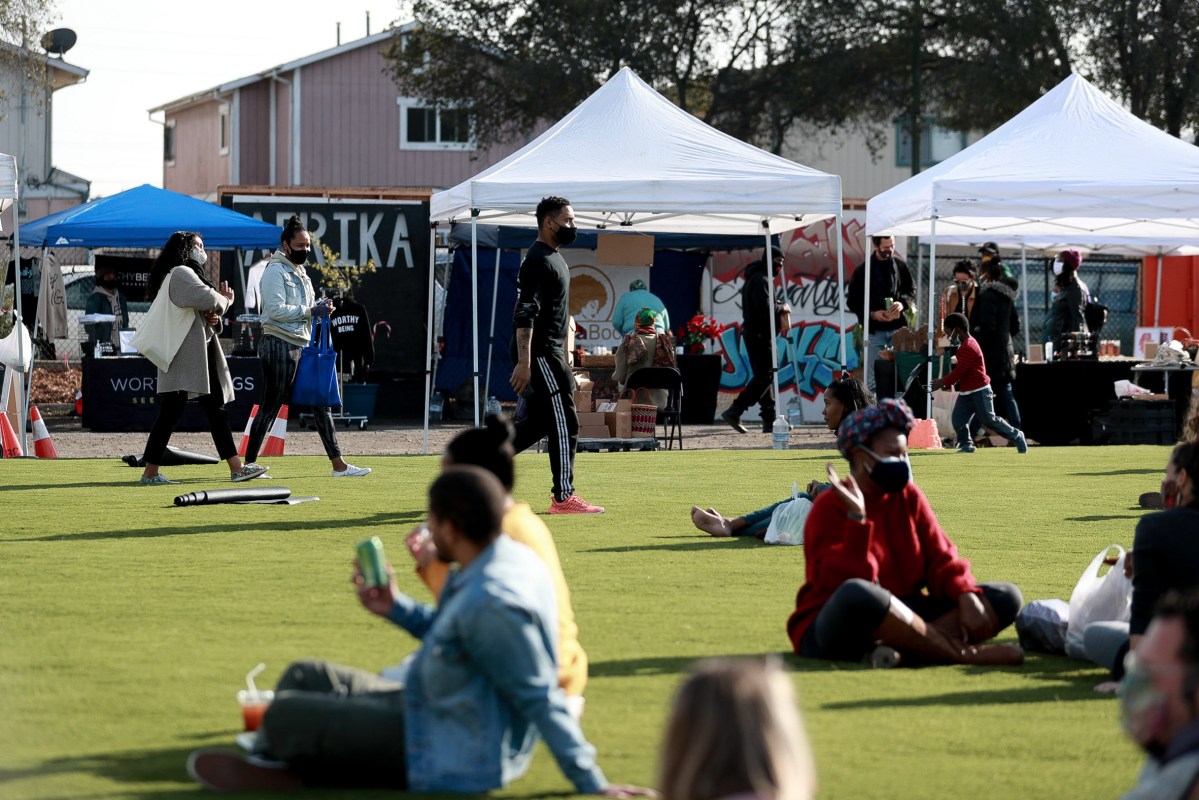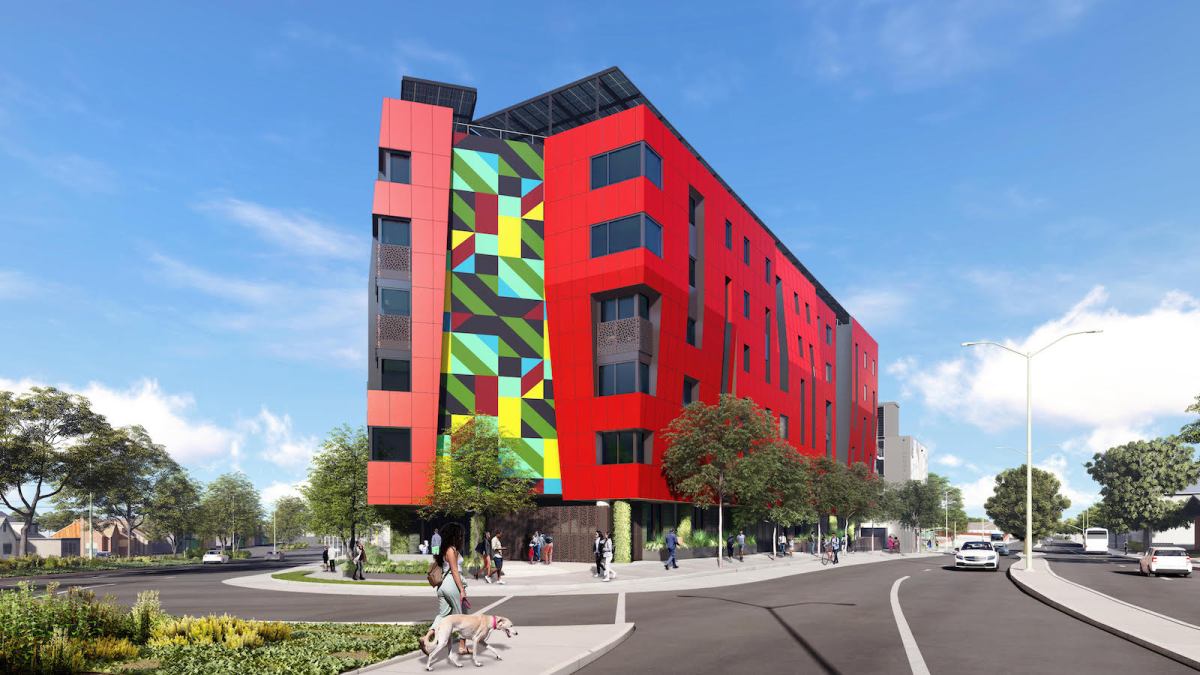Oakland is poised to enter into a development deal for affordable housing, a food hall, offices—and an outdoor skating rink—in East Oakland.
The 1.2 acres of city property on Foothill Boulevard and 73rd Avenue is the current site of Liberation Park, a community hub created by the Black Cultural Zone Collaborative.
BCZ, a community development corporation focused on furthering economic opportunities and preserving Black culture in East Oakland, is also leading the proposed development project, along with Eden Housing and the Community Arts Stabilization Trust.
A committee of the Oakland City Council gave an initial stamp of approval to the land deal Tuesday afternoon, voting to send it up to the full council for a final decision Feb. 20. Councilmember Carroll Fife called the transfer of the property—part lease, part sale—“reparations” for historic disinvestment in areas like East Oakland.
The mood in the council chambers was celebratory Tuesday, with representatives from BCZ and Liberation Park saying the project reflects self-determination for Black Oakland residents and others who’ve been systemically forced out and priced out of their homes for decades.
In a fiery statement to the committee, BCZ CEO Carolyn Johnson recounted how her grandparents and parents were repeatedly forced to leave their homes in West Oakland, San Francisco, and unincorporated Alameda County for “urban renewal” projects.
More recently, Oakland lost a significant part of its Black population, which fell from 27% in 2010 to 20% in 2020, as rents and house prices shot up over the past decade.
The plan to develop at Liberation Park is an effort to “retain, return, and resource a community for whom home has never been permanent,” Johnson said, “but subject to the whims of capital markets, for-profit real estate developers, and others with the power to remove us by action or inaction.”
The proposal includes a six-story affordable-housing building with 119 apartments for up to 400 residents. The apartments—a range of studios up to three-bedroom units—would be rented to tenants making between 20-60% of the area median income. City staff said the goal is to reserve some of the apartments for formerly homeless residents.
A “Liberation Park Market Hall” is the second piece of the project—a three-story building with a food hall like Swan’s Market, a performance space, service provider offices, and an outdoor skating rink, like the rink built at the park.
“My sense is that many of the vendors that are currently offering their goods at the Akoma Market will also be part of this new project,” said Jens Hillmer, Oakland economic coordinator, at the meeting.
The Akoma Market is a farmers market and small business expo operated by BCZ at Liberation Park. The market emphasizes Black and brown vendors, who can operate booths for free and receive support launching their businesses. At Tuesday’s meeting, Reggie and Nicole Borders of Pound Bizness said the market was a stepping stone to larger platforms for their pound cake enterprise.
BCZ’s license to run the market expires in October, but the development deal would extend the license until 2027 or until the housing construction begins, whichever comes sooner.
Hillmer said keeping the site “activated” is a win-win for the city and BCZ: “‘Otherwise it would be vacant and subject to dumping.”
For the housing portion of the proposed project, the city would lease the land to the developers for 99 years, and finance the cost of renting it by providing a $1.5 million, 55-year loan. Hillmer said Oakland has traditionally waived rent for affordable projects on city land, but the loan approach is part of a new effort to “recapture” some of the investment to use on other affordable development.
For the commercial part of the project, the city would sell the parcel of land where the food hall would be constructed to the developers for $995,000, considered market-rate.

In the first half of the 20th Century, the land was part of a Chevrolet plant, and later it hosted a tire shop. The Oakland Redevelopment Agency bought the land in 2008.
Several other uses have been floated over the years, including a satellite campus for Merritt College, a shopping center with a Starbucks and job training program, and a new library, but none panned out.
In 2020, the city put out a call for development proposals, receiving four responses. In October 2021, the Oakland City Council approved an 18-month exclusive negotiation agreement for a lease with BCZ, then working with Curtis Development. The proposed deal coming to council is a result of those negotiations. Y.A. Studio is the architect on the housing project, and blinkLab is the architect for the market hall.
“Black people often feel forgotten,” said Councilmember Kevin Jenkins, whose district includes Liberation Park, on Tuesday. “I hope this project is something people can be proud of in the Eastmont neighborhood.”
Johnson from BCZ said the project will serve a “legacy community” that “won’t, can’t, and shouldn’t give up hope that we can remain and finally have a forever home.”
But even if the council approves the deal, there’s one other hurdle in the way of the project: the site comes with a decades-old deed restriction prohibiting restaurants on the property, because they might compete with a nearby McDonald’s and Taco Bell. The city is in negotiations with those companies to try to amend the agreement.
Correction: This story previously said Y.A. Studio was the architect for the Liberation Park development project. The firm is designing the housing portion, while blinkLab is designing the market hall.

